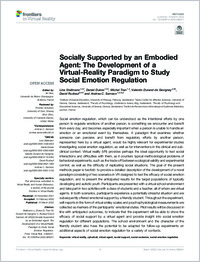Socially Supported by an Embodied Agent: The Development of a Virtual-Reality Paradigm to Study Social Emotion Regulation
IPC
- Stallmann, Lina ORCID Institute of Special Education, University of Fribourg, Switzerland; Swiss Center for Affective Sciences, University of Geneva, Switzerland
- Dukes, Daniel ORCID Institute of Special Education, University of Fribourg, Switzerland; Swiss Center for Affective Sciences, University of Geneva, Switzerland
- Tran, Michel Institute of Special Education, University of Fribourg, Switzerland; Faculty of Psychology, Unidistance Suisse, Brig, Switzerland
- Durand de Gevigney, Valentin ORCID Center for Affective Sciences, University of Geneva, Switzerland; Institut de Recherche en Informatique et Systèmes Aléatoires, Lannion, France
- Rudrauf, David ORCID Center for Affective Sciences, University of Geneva, Switzerland; Faculty of Psychology and Educational Sciences, University of Geneva, Switzerland
- Samson, Andrea C. ORCID Institute of Special Education, University of Fribourg, Switzerland; Swiss Center for Affective Sciences, University of Geneva, Switzerland; Faculty of Psychology, Unidistance Suisse, Brig, Switzerland
- 10.03.2022
Published in:
- Frontiers in Virtual Reality. - Frontiers Media SA. - 2022, vol. 3
English
Social emotion regulation, which can be understood as the intentional efforts by one
person to regulate emotions of another person, is something we encounter and benefit
from every day, and becomes especially important when a person is unable to handle an
emotion or an emotional event by themselves. A paradigm that examines whether
someone can perceive and benefit from regulatory efforts by another person,
represented here by a virtual agent, would be highly relevant for experimental studies
investigating social emotion regulation, as well as for interventions in the clinical and subclinical
context. Virtual reality (VR) provides perhaps the ideal opportunity to test social
interactions and difficulties with them, as it counters typical methodological problems of
behavioral experiments, such as the trade-off between ecological validity and experimental
control, as well as the difficulty of replicating social situations. The goal of the present
methods paper is twofold: to provide a detailed description of the development of a novel
paradigm consisting of two scenarios in VR designed to test the efficacy of social emotion
regulation, and to present the anticipated results for the target populations of typically
developing and autistic youth. Participants are presented with a virtual school environment
and take part in two activities with a class of students and a teacher, all of whom are virtual
agents. In both scenarios, participants experience a potentially stressful situation and are
subsequently offered emotional support by a friendly student. Throughout the experiment,
self-reports in the form of virtual smiley scales and psychophysiological measurements are
collected as markers of the participants’ emotional states. Pilot results will be discussed in
line with anticipated outcomes, to indicate that the experiment will be able to show the
efficacy of social support by a virtual agent and provide insight into social emotion
regulation for different populations. The school environment and the character of the
friendly student also have the potential to be adapted for follow-up experiments on
additional aspects of social emotion regulation for a variety of contexts.
person to regulate emotions of another person, is something we encounter and benefit
from every day, and becomes especially important when a person is unable to handle an
emotion or an emotional event by themselves. A paradigm that examines whether
someone can perceive and benefit from regulatory efforts by another person,
represented here by a virtual agent, would be highly relevant for experimental studies
investigating social emotion regulation, as well as for interventions in the clinical and subclinical
context. Virtual reality (VR) provides perhaps the ideal opportunity to test social
interactions and difficulties with them, as it counters typical methodological problems of
behavioral experiments, such as the trade-off between ecological validity and experimental
control, as well as the difficulty of replicating social situations. The goal of the present
methods paper is twofold: to provide a detailed description of the development of a novel
paradigm consisting of two scenarios in VR designed to test the efficacy of social emotion
regulation, and to present the anticipated results for the target populations of typically
developing and autistic youth. Participants are presented with a virtual school environment
and take part in two activities with a class of students and a teacher, all of whom are virtual
agents. In both scenarios, participants experience a potentially stressful situation and are
subsequently offered emotional support by a friendly student. Throughout the experiment,
self-reports in the form of virtual smiley scales and psychophysiological measurements are
collected as markers of the participants’ emotional states. Pilot results will be discussed in
line with anticipated outcomes, to indicate that the experiment will be able to show the
efficacy of social support by a virtual agent and provide insight into social emotion
regulation for different populations. The school environment and the character of the
friendly student also have the potential to be adapted for follow-up experiments on
additional aspects of social emotion regulation for a variety of contexts.
- Faculty
- Faculté des lettres et des sciences humaines
- Department
- Département de Pédagogie spécialisée
- Language
-
- English
- License
- Open access status
- gold
- Identifiers
-
- DOI 10.3389/frvir.2022.826241
- ISSN 2673-4192
- Persistent URL
- https://folia.unifr.ch/unifr/documents/320800
Other files
Statistics
Document views: 85
File downloads:
- frvir-03-826241-2: 162
- datasheet1_sociallysupportedbyanembodiedagentthedevelopmentofavirtual-realityparadigmtostudysocialemotionregulation: 95

